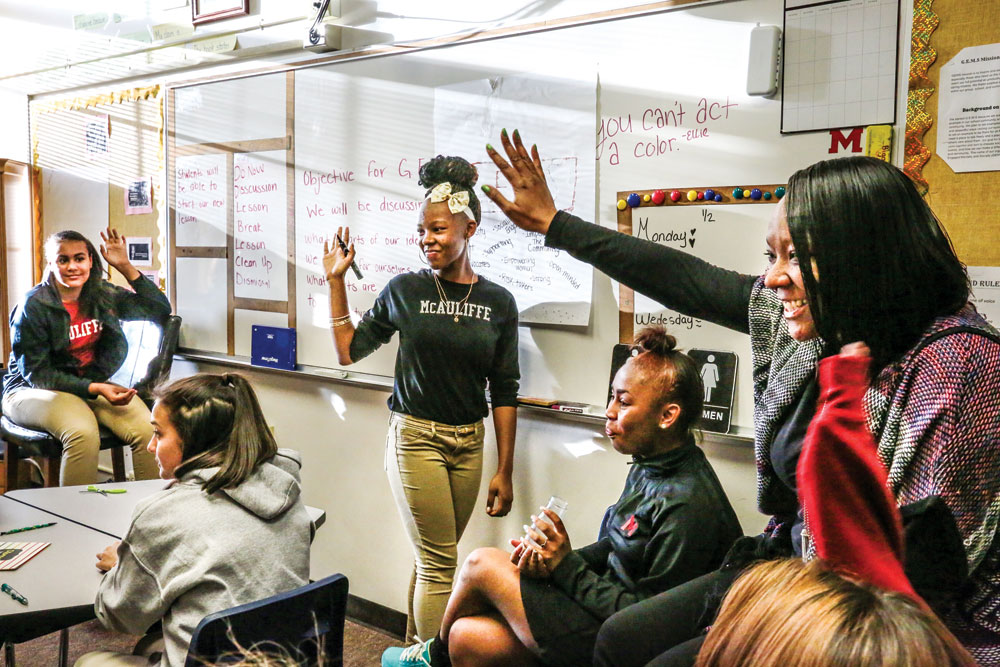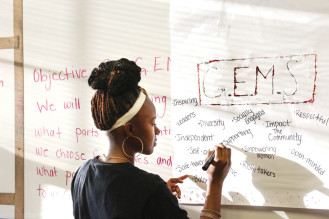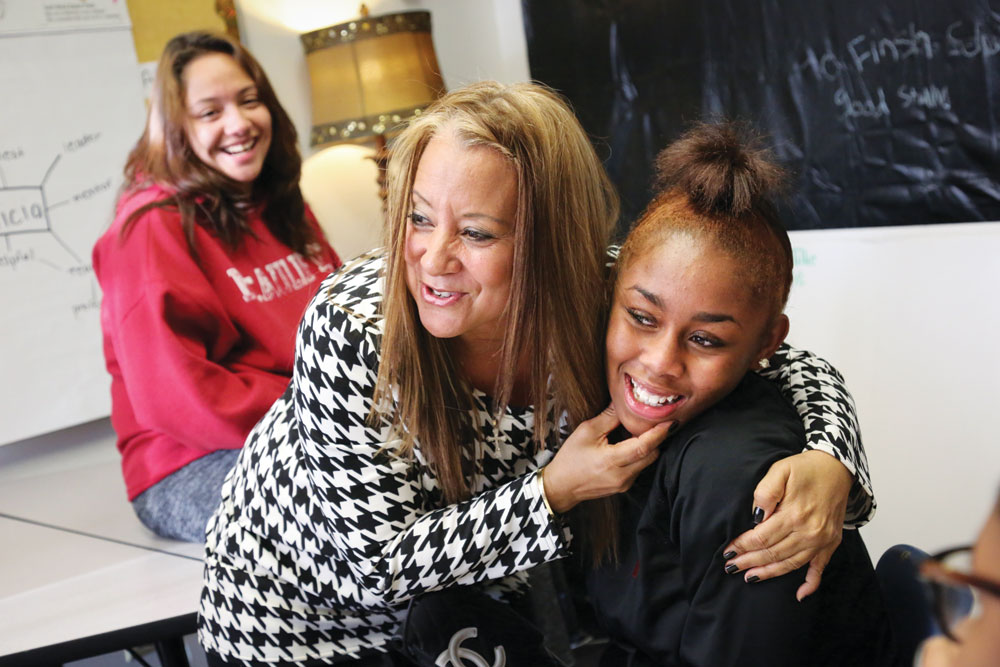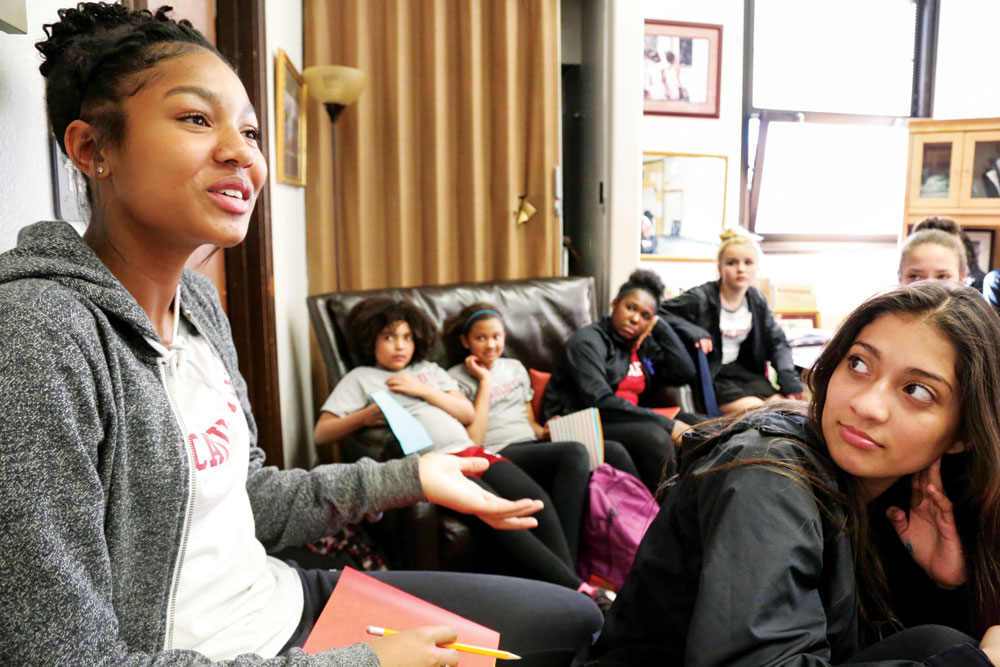
Madison Wortham, far left, Lynnsie Holloway, center, Jaidyn Fears, middle right, and Lena Price, far right participate in a conversation during a G.E.M.S. meeting.

Lynnsie Holloway writes the group’s mission for G.E.M.S.
It’s a quaint room with a couch and scattered chairs. It doesn’t feel like a typical classroom. A seventh-grader sits across the room working on something.
We begin our conversation and about 20 minutes in, a young woman comes in crying. “Ms. Biggs, I need a meeting,” she says desperately. Alicia Biggs and the other seventh-grader in the room immediately embrace the young woman. “OK, what’s going on? Are you OK?” They talk through what happened, take deep breaths, and she goes into a neighboring room to relax.
“This is typical. Instead of getting upset at a teacher, the girls come down here and we talk it out. I give her the words to deliver with respect,” Biggs tells me, simultaneously emailing the student’s teacher to let her know she is OK and in her room.

Alicia Biggs playfully embraces Jaidyn Fears while Alexia Del Valleleft laughs.
Alicia Biggs is the administrative assistant at McAuliffe International School at 25th and Holly. She has highlighted blonde hair and chunky gold jewelry, which clacks on her keyboard as she types.
“We want a safe place to come and talk about anything that is going on in our lives and know that it’s going to be safe. Mentally and socially we want to be able to express ourselves and for other girls to be engaged and help build each other up and be a support system.”
A few months ago, a few seventh-graders, including Lynnsie Holloway, decided to do something about the number of cliques among girls at the school. “A lot of us are all going through similar stuff, so I wanted to bring the girls together,” Holloway says.
They formed G.E.M.S., Girls Engaging Mentally and Socially, a support group for young women attending McAuliffe. The group has grown to more than 25 girls and is changing the happiness, well-being and academic performance of these young women.
Biggs and Lynnsie’s mom, Lena Price, mentor the group.
Many of the G.E.M.S. do not have moms at home and are being raised by grandparents. G.E.M.S. is a sisterhood that gives them the opportunity to relate about difficult issues and ask female role models questions.
After school every Tuesday and Thursday, the girls cozy up in this small room and talk about everything affecting their lives. They also go on activities together including bowling, visiting the Black Rodeo, and by the end of the year, will go to Elway’s for dinner and a theatre production.
Although hosted in the school, G.E.M.S. meetings feel nothing like school. No one raises her hand. All the conversations are nonjudgmental and confidential, unless it involves a safety issue.
They’ve talked about topics including depression, social media and relationships. After talking about social media, Biggs took all of their phones for one night and locked them in her room. Initially there was panic, but in the end they were grateful to know they could survive without phones. Everyone still arrived at her room early the next morning.
For their conversation about relationships, they invited boys at the school to share their perspectives. The boys explained they get physically attached, but not as emotionally attached as girls.
Price likes to challenge the girls with questions they wouldn’t expect, like why do you guys love expensive tennis shoes? Or why do you think there’s the misconception that all black people like chicken?

Jalaya Gilmore shares her thoughts as Nadia Barajas listens.
Price admits she was afraid to have a daughter. Her boys were easy to raise—“barber shop, football, food, and they’re good.” Growing up she was the popular girl, but didn’t always want to be. “I wanted to flourish and I wanted to hang out with the white kids and be diverse and experience different things. One side or the other always had something to say about it, you’re acting too this. I want my daughter, and all the G.E.M.S. to be well-rounded mentally; everything else will fall into place.”
Price and Holloway are a powerful mom-daughter example for the group. They listen intently when the other is speaking, laugh like best friends, and trust one another.Many G.E.M.S. do not have many adults they like or look up to. Some feel their teachers, almost all of whom are white, do not care about or understand what they’re going through at home. Several experience depression, anxiety, or have had suicidal thoughts. This comes out in the classroom at times.
At G.E.M.S., they talk about long-term goals and how school fits into that. Biggs and Price role-play as teachers for the G.E.M.S. to practice assertive and respectful communication when they get upset in the classroom.
“We want them to learn to advocate for themselves in a respectful manner and teach them they have good sense, because they do, even though they don’t always show it,” Price says.
The effort goes both ways, though, according to Biggs. She has hosted Cultural, Race and Equity workshops for teachers at the school to learn about their own differences and teaching across cultures.
If a student feels she cannot communicate with a teacher and the conversation is too emotional, she can always come to this room. Biggs and one of the other G.E.M.S. will be there ready to wipe her tears.
G.E.M.S. will continue throughout the summer months, and Price and Biggs encourage the girls to call or text anytime. They continue to recruit girls who seem like they may need someone. Price says, “Find someone in your life, whether it’s a friend, cousin, mentor to talk about things. You are not alone.”




0 Comments